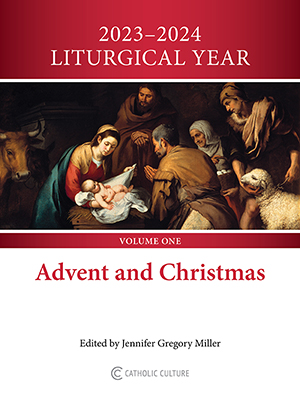The MOST Theological Collection: Grace, Predestination and the Salvific Will of God: New Answers to Old Questions
"Pt. 1: Research in the sources of revelation - Ch. 6: Official teaching on the Sacred Heart and Immaculate Heart"
74. Christ has a fully human love of men: We have already seen the teaching of the Church on the love of God and of Christ for us, and we have seen also the earlier revelations on this subject in the Old Testament. Additional passages can be found in the great encyclical of Pius XII, Haurietis aquas.1
But we still ought to bring out one aspect on which nothing was said above. For, if God had not become man, perhaps someone could have said: "The ways of God are most lofty: who can understand them? Perhaps therefore God can desert some before considering their demerits."
Such a statement cannot properly be made. For God became man in such a way that, according to the official teaching of Pius XII,2 Christ has a threefold love, namely:
1) Divine love "which He shares with the Father and the Holy Spirit."
2) Human spiritual love, which resides in the spiritual human soul of Christ: "Furthermore [His Heart] is a symbol of that fiery love which was infused into His soul, and enriches the human will of Christ."
3) Human sensory love: "And finally-and that, in a more natural and direct way-[His Heart] is also a symbol of sensory affection, for the body of Jesus Christ enjoys a most perfect power of feeling and perceiving, truly more than all other human bodies."
Now, no really human heart wants to permit anyone it loves to suffer without necessity without personal fault. But the Heart of Christ is fully human and is enkindled with great love, even sensory love, for us, so that Pius XII said, as we have already seen:3 "And actually our divine Redeemer was nailed to the cross more by love than by the violence of the executioners; and His voluntary holocaust is the supreme gift that He imparted to each individual man, according to the terse statement of the Apostle: 'He loved me, and gave Himself up for me.'" Therefore, the Heart of Christ does not want to desert4 anyone without grave and persistent personal demerits. For He who suffered so much for each individual out of love, has proved and demonstrated a most vehement love for each individual.
But if someone objects: "Yes, the Heart of Christ has human love. However, the person of Christ is a divine person. We cannot understand such a person"-we reply: By His actions, as Pius XII shows,5 Christ showed that His love is such as we have said it to be. Especially in the parables of mercy, as Pius XII said,6 ". . . the very Heart of God is manifested."
75. Mary, who dispenses all graces, has a merely human heart: But the difficulty just mentioned cannot even be broached in the case of the Immaculate Heart of Mary, for Mary is a merely human person. But she is also the most loving spiritual Mother of all men, as many Popes have officially taught,7 and, at the same time, she has the power of dispensing all the treasures of divine grace as she wills. Now, no mother's heart, even that of just an ordinary mother, wills to permit her children to be deserted through no fault of their own. Rather, they defend as much as possible even those sons who are actually wicked. How much less is the heart of the best of Mothers willing to permit that her children be deserted through no fault of their own, so that it would be metaphysically inconceivable that they be saved, and so that they would suffer inexpressibly forever in eternal fire. As Benedict XV taught,8 Mary is "suppliant omnipotence." Nothing that she wishes is refused. Therefore, whatsoever any theologian may wish to think about predestination, all effects of predestination, the distribution of all graces, must be such as to be completely pleasing to the heart of the best of Mothers. Hence, any theory that cannot fully harmonize with this truth that is taught by the Popes, must be rejected.
We must not forget, too, that, as Pope John XXIII taught, divine mercy9 "'like an overflowing river, carries all souls along with it' and beats with a more than motherly love 'since God is quicker to pardon than a mother is to snatch her son from the fire.'" Therefore, God Himself has precisely the same disposition as the Heart of Mary.
76. Objection: These things are too anthropomorphic.
Answer: Christ has a completely "anthropomorphic" Heart. For He was really made "anthropos" for us; and, according to the official teaching of Pius XII10 ". . . in the parables of mercy . . . the very Heart of God is manifested." For we must learn about God through Christ, who is the Word, the perfect expression of God. We learn through both the actions and the words of Christ, particularly the comparisons which He has graciously given us, most especially through the analogy which He proposed again and again, that God is our Father. He taught us to call God Our Father. Surely, it is better and safer to learn about God in the way in which Christ taught us, than to try to deduce the ways of God by mere human reasoning. As St. Thomas warns us:11 "Those things . . . that depend solely on the will of God . . . cannot be known to us except insofar as they are handed down in Sacred Scripture, through which the divine will becomes known to us." The extent of the love of God for us depends solely on His generous will: it cannot be deduced from metaphysics. In this chapter, we are simply repeating the doctrine of the Church, and almost in the identical words used by the Church.







